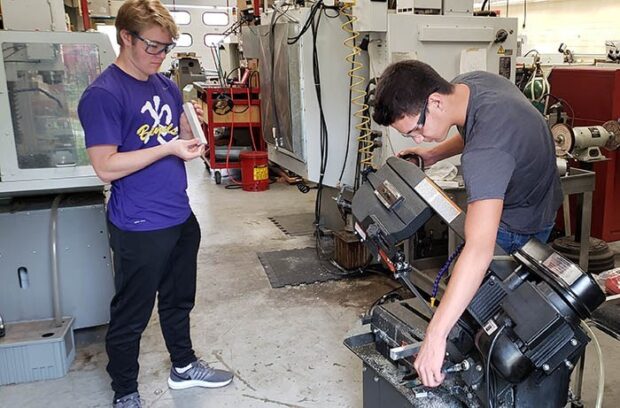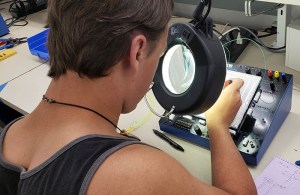
This article was provided by the Idaho Department of Labor and written by Steve Stuebner.
Nezperce High School senior Joe McGuigan is one of a handful of high school students who landed a summer job with a manufacturing company after participating in an industry-based apprenticeship program. He worked for Hillco Technologies last summer, starting at $11 an hour as a summer intern, and he learned a wide variety of skill sets on the job, including driving a forklift and running machines.
There are more than 100 companies engaged in metal fabrication and manufacturing in north central Idaho – machine shops, guns and ammunition, farm equipment manufacturers and more. The workforce serving those companies is aging and nearing retirement age, and there’s a shortage of entry-level workers with the skills necessary to serve the industry.
“Manufacturing has picked up in the small communities in north central Idaho, including in Lewiston and Grangeville, and it’s tough hiring people to work in manufacturing in this area,” said Lenny Hill, McGuigan’s boss and president of Hillco Technologies.
Hillco manufactures combine-leveling systems for farmers harvesting wheat in the steep, rolling Palouse countryside in the Palouse region, among other things. Located in Nez Perce, the company employs about 35 employees and typically pays a starting wage of $18-$19 an hour.
“We like to recruit locally because job candidates understand the rural nature of this area and the outdoor lifestyle,” Hill said. “If they come from outside the area, a few of them might stick, but often we’re a little too remote compared to what they’re used to. It might be hard to find a Domino’s nearby or a Starbucks.”
Hill is a member of the Northwest Intermountain Manufacturing (NIMA) Association, a trade association in the region. He was supportive of forming a partnership between the Northwest Intermountain Manufacturers Association, Lewis-Clark State College, the Clearwater Economic Development Association, the University of Idaho and 16 school districts to create a pilot project to train high school students in fabrication and machining. The concept is to give students a solid skill set and educational background in manufacturing so they can be ready to start work right after high school for local companies.
Eighty-nine students signed up the first year; 28 students enrolled in the program during the final year of the three-year pilot program. It’s a rigorous program with challenging academic standards. Students are required to complete seven college-level courses in manufacturing and fabrication from the time they are a sophomore, so they can complete the course work by the time they graduate.
Idaho Department of Labor officials also worked as a resource to develop a NIMA School-to-Registered Apprenticeship Program to provide a work-based learning component to the program. McGuigan signed up for that as well.
Taking the required seven college-level courses online in between his regular class-load as a high school senior, plus being involved in three varsity sports, makes for a busy life for Joe McGuigan. “I’ve got a lot of homework,” he said. “I’m taking dual-credit classes, and I’ve got a senior project to do as well.”

His senior project is about his summer experience at Hillco. He runs cross-country in the fall, plays basketball in the winter and runs track in the spring. “I’d like to wrestle, too, but I don’t think I’ll have time,” he said.
He’s been exposed to quite a bit of engineering-type of classes – he’s taken Auto Cad Basic and Intro to Engineering, among other things. He’s discovered that to become an electrical or mechanical engineer, it will involve a lot of math and physics. “That’s not my strong point,” he said.
But he realizes the job skills he learned at Hillco may work well for supporting himself while he goes to LCSC, summer work or after college. “I’m glad I got to work at Hillco as an opportunity,” he said. “I’ve heard you may not get your dream job right out of college, so I’ll have some stuff to fall back on.”
Twenty-seven other high school students who are still engaged in the NIMM pilot program may also choose to work in metal manufacturing or fabrication. Students have toured 12 different companies in the region that need a skilled manufacturing workforce such as Schweitzer Engineering and Idaho Forest Group.
When they complete the NIMM program, students will earn an industry-recognized certificate in Mechanical Computer Aided Design and Drafting or in Machining and Electronics.
Working together with a manufacturing association on the apprenticeship program had a lot of benefits, said Diane Hairston, a senior workforce consultant for the Idaho Department of Labor in Lewiston. “An association-sponsored program creates structured training guidelines recognized by all members,” she said. It also provides consistency in the skills needed for the local labor pool, she said.
The Northwest Business Development Association of Spokane provided a $500 stipend to students who completed the first year of the program, and Comstrat Corporation of Lewiston donated 13 computers for the NIMM program for students who didn’t have access to computers at home. The Idaho Digital Learning Academy provides the online education program for students through LCSC.
The University of Idaho was instrumental in recruiting businesses to participate in the pilot program, Christine Frei, executive director of the Clearwater Economic Development Association, said. The Clearwater Economic Development Association, NIMM, NIMA, LCSC and UI are all interested in helping local businesses grow and provide a skilled workforce.
“I really like the way this NIMM pilot program came about,” said Jeff Ober, Dean of Career & Technical Education at LCSC. “They talked to local manufacturing businesses about their needs and worked backwards from there. That’s the really unique part. The companies are going to get exactly the skillsets they need, and we’re developing new ways for students to find a career close to home.”
A $839,809 grant from the National Science Foundation funded the first go-round. All of the entities engaged in the NIMM pilot program are working to find a new source of funds after the first group of students complete their studies as high school seniors in 2020.
Frei said she’s excited about the NIMM pilot project because it seeks to fulfill the needs of local businesses and industry with skilled workers.
“So far, this pilot program is surpassing our expectations,” Frei said. “We’re creating a career technical program in rural schools. It’s turning out really well.”
It’s not unusual for parents in rural areas to worry about their kids being able to find a good-paying job close to home, especially if their kids don’t necessarily want to go on to college.
“I love the idea and really want this program to succeed,” said Rebecca McGuigan, Joe’s mom. “This has been a really positive experience for my son. I mean this is a big step up considering he used to mow lawns in the summer.”
Find more information about apprenticeships on the Labor website.
